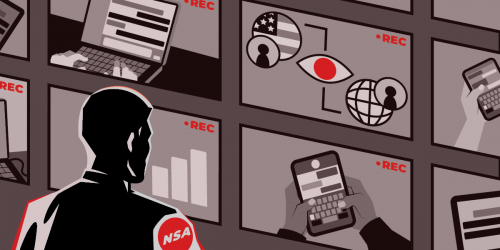The debate over telecom immunity has now spanned almost two years. When the first proposal to grant immunity to the telecoms was introduced in Congress, in September of 2006, no one thought the fight would last this long.
As we ponder the bizarre spectacle of a Congress that has willingly and repeatedly rolled over on the Bush administration's expansive claims of executive power, it is worth remembering that at one time it appeared that there would be hardly any resistance at all to the question of whether to grant immunity to the telecoms that participated in Bush's illegal warrantless wiretapping program.
Telecom immunity had the same air of inevitability that plenty of bad laws have as they sail through Congress to ultimate passage. For one thing, it was backed by powerful corporations that bankroll both parties and have armies of lobbyists patrolling Capitol Hill. The President vehemently insisted on immunity, repeatedly threatening to make use of his veto power against any FISA reform bill that didn't let his telecom friends off the hook. Republicans in Congress vowed to vote in virtual lockstep on the issue (and they were joined by key Democrats). The entire intelligence community thought it was a grand idea. And, while a
href="http://www.nytimes.com/2005/12/21/politics/21nsa.html">few
href="http://articles.latimes.com/2005/dec/25/nation/na-spy25">important articles appeared in major papers, the wiretapping scandal didn't generate the level of coverage it deserved. Many assumed the public to be acquiescent on the issue.
Read more after the jump...
But the proponents of immunity got more than they bargained for. Despite the long odds, they were forced to regroup and retrench repeatedly, as public opposition to granting immunity to lawbreakers began to grow — slowly at first, later building into a seemingly unstoppable movement. Time after time, Congress was set to vote on this crucial issue, but was forced to set it aside after being deluged by phone calls and letters from angry constituents and excoriated by editorial boards of papers large and small across the nation. It was pushed back a week, then another week, then until after the winter recess, then the spring recess, and on and on...
At EFF, the process was trying, to say the least. Month after month we rallied our membership to step up and take action to defend the Constitution and the 4th Amendment. We even tried some novel techniques in an attempt to rouse the masses. At times, we worried that we were in danger of sounding like the Boy Who Cried Wolf. After a while, the action alerts seemed to write themselves: "Urgent! Last Stand on Telecom Immunity! Take Action Now!" (We apologize to our regular readers for the repetition, but in truth we cannot say it won't happen again.)
But the public was interested — and remained interested — in the complex and often arcane details of FISA reform. Blogs big and small kept the story alive, even when the major news sources were content to let the story languish on the back pages. Glenn Greenwald's blog at Salon.com led the pack, but there were many, many others. Blogs like Firedoglake, Ars Technica, Wired's Threat Level and DailyKos's McJoan all jumped on the story and stayed on it, month after month. Editorial pages from around the country — ranging from giants like the New York Times to the tiniest small town papers — spoke out as well. All of which ensured that action alerts from EFF, the ACLU, Move-On, People for the American Way, Blue America and others were put to good use in record numbers. To everyone who took action in any way on this issue, a big, delirious thank you from all of us at EFF!
When the President launches a full frontal assault on the Constitution, you would think a few Senators would stand up and fight. On this count, we were not disappointed. Senators Dodd and Feingold rose to the occasion, pounded the podium, and in language that borrowed from the great debates of the American Revolution, warned in stentorian voice of the danger of allowing an out-of-control Executive to violate the privacy rights of millions of innocent Americans. Dodd in particular deserves high praise for insisting on discussing the evidence brought forward by whistleblower Mark Klein that forms the backbone of EFF's case — evidence that the President so desperately hopes to prevent a judge from reviewing.
But the movement that rose to oppose telecom immunity did more than demonstrate the increasing power of the global public square known as the Internet. It showed that there is a constituency — a loud, organized, and active constituency — that will passionately defend the Constitution, privacy rights, and the rule of law. Lawmakers from both parties — presidential candidates included — ignore this movement at their peril.
Americans of the future may one day look back at this moment in history and wonder at how a free society could allow the government, working in tandem with a few corporations, to install a surveillance network directly into the nation's telecommunications backbone. They may marvel at first at how easily we surrendered our treasured freedoms. But when historians dig a little deeper, they will find that these changes did not happen without a fight. They will see that, in the face of impossible odds, a diverse coalition of civil libertarians, scrappy non-profits, and citizens from all walks of life rose to meet the challenge, and fought valiantly to defend the values this country was founded upon. They may even find that, eventually, we won.
The legislative battle against telecom immunity has been lost, for now. But as long as the architecture for dragnet surveillance remains installed in the communications hubs around the country, EFF will continue the fight. We'll be challenging the immunity provisions passed by Congress as unconstitutional; we will seek repeal of immunity in the next session of Congress; and we will bring a new suit against the government, challenging the nationwide snooping network that Mark Klein helped uncover.
If you are a member of EFF, thank you. If you have not yet joined our fight, now is the time, because we are only just getting started.







